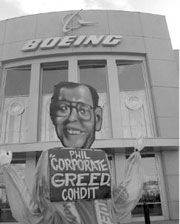CATASTROPHE. Disaster. Bombshell.
Last week’s headlines described Boeing’s headquarters shift as having an explosive impact here.
Actually, the outcome may be more like the famed terrorist plot to blow up the Space Needle. Plot it may have been. Explosive it wasn’t. We should have learned about overreaction then. The mayor and others got rattled, and we got our 2000 New Year’s Needle bash canceled.
Boeing’s announcement seems to have sparked similar reactions. All the long faces, angry words, and political finger-pointing—Seattle acted like it was time for the last person leaving town to turn off the lights, again.
Of course the news took us by surprise. It came soaring out of the blue, like Tex Johnson barrel-rolling a Dash 80 over Lake Washington. The onetime company town would be losing the company. Say it ain’t so.
Eight decades of tax breaks and fawning politicians weren’t enough; the head honchos down at the Lazy B were getting out of Dodge. Actually, Boeing CEO Phil Condit had already left. He made the big announcement from the other Washington. Maybe it was safer there. After all, didn’t he say he preferred not to work with his Seattle minions? One of them “can wander down the hall and say, ‘Well, whadda you think?’ And I don’t want him to do that [wander, not think]; I want him to run his business. So it does affect the dynamics” to be all bunched up at headquarters.
The press release Boeing issued here was similarly obtuse. It said: “Boeing today announced several major changes to its corporate architecture: elevating three senior business unit executives to chief executive officers, setting plans for a new, leaner corporate center focused on shareholder value and [oh, one more thing] moving its headquarters to a new location.”
Denver, Dallas, and Chicago were named the three contest finalists.
Reality should have dawned there.
We weren’t losing the company—78,000 Boeing workers will remain gainfully employed in Washington. With at least half of the 1,000 headquarters staff moving, we were just gaining office space.
A few powerful leaders would be gone. So what? If we can survive losing Junior and A-Rod, we can suffer the departure of Phil and Harry. Think of it as a trade. Denver, Dallas, or Chicago gets CEO Condit and President Stonecipher, with an office staff to be named later. In return, we get a break—a refreshing lack of whining from the ivory tower.
Out of sight, out of earshot.
There was Condit on TV the day of the announcement, for example, complaining about the extensive travel a million-dollar CEO must undertake, getting up early, flying to D.C. in a plush corporate jet, toting those bags of soft money up the Capitol steps. In one recent time period, he said, he had to fly Washington-to-Washington 13 times. It was grueling, exhausting; he didn’t like it.
Stockholders must have enjoyed that one. The leader of the world’s greatest plane-making company hates to fly? Well, who knows. Maybe Bill Gates secretly despises microchips.
Condit claimed Boeing was moving because operations need to be more centralized. Of course, that was a smoke screen. Moving the headquarters east or south from Seattle hardly puts Boeing closer to its biggest potential markets—in Asia.
Besides, in this high-tech world of e-mail, faxing, cell phones, video teleconferencing, and satellite communications, who needs costly face-to-faces? If a human is required in D.C., New York, or London, send over an exec from the regional office. Boeing operates dozens of such outposts around the world.
So it’s really not about new middle ground or a better commercial climate for the home office. More logically, Boeing’s bigwigs want to blow town for personal reasons. They’re tired of getting an earful here.
Noisy demonstrators line up outside their high-profile headquarters. Angry strikers parade past their office windows. Every jet crash, nasty lawsuit, and economic setback lands at the Marginal Way doorstep, soon bringing the probing questions of experienced local media.
At supermarkets and bars, meetings and cultural events, Boeing brass can encounter one of hundreds of thousands of past and present Boeing workers or their family members wondering what’s this about closing plants, why is Airbus kicking butt, why did you lay off Uncle Gus?
That won’t happen in Dallas, Denver, or Chicago, which lack major Boeing plants, workers, and media with vested interests. Phil, Harry, and the others can blend into the crowd. Life will be good.
And what the hell, why begrudge them? It’s just business.
As my kindly bartender likes to say, “No hard feelings. But thanks for leaving.”
What Really Happened (1) Flyin’ home
I see this as all about a Republican brown-liquor weekend retreat in Virginia, with Karl Rove, Slade Gorton, and Phil Condit conversing while Katherine Harris and Karen Hughes take turns sitting in their laps.
Karl offers Phil a quid pro quo. We need to pay back Washington state for voting for Gore and for defeating Gorton. We need to humiliate Gary Locke—despite his conservatism, he is dangerous to the Republican cabal because he is not a white-bread American male—as well as Patty Murray and Maria Cantwell, who are not only Democrats but also women. It also takes a shot at big labor.
What does Boeing get? As widely noted in the press, Boeing’s earnings and stock price have gone flat. One way to ensure future growth is to win the huge core contract for [Star Wars, a.k.a the Strategic Defense Initiative]. So what if it isn’t a workable missile defense system? It’s a $100 billion or maybe even a $200 billion contract; and if it keeps on not working, it could be worth more than that.
Denver and Chicago are both smokescreens. American Airlines, headquartered in Dallas, cancelled a large Airbus order last week and awarded it to Boeing. QED: Boeing is coming home—to Texas.
Henry Ellard is a marketing consultant for CCG International.








